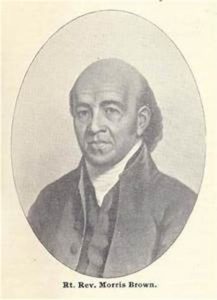
Rev. Morris Brown
*On this date in 1770, Morris Brown was born. He was a Black minister and abolitionist.
Born to parents who were free people of color in Charleston, South Carolina, Brown received no formal education, and he was taught skills at home. He and his family were prosperous and considered part of the city's free Black elite. Its large Black population was mostly enslaved in the antebellum years. Brown became a skilled shoemaker. After a religious experience in the Methodist Church, he received a license to preach.
The Methodist and Baptist churches evangelized to free and enslaved Blacks during this period. They allowed them to be preachers and members, but the church congregations usually required all people of color to sit in segregated sections. Brown married Maria, and they had six children. He was one of the founders of the African Methodist Episcopal Church and its second presiding bishop. He founded Emanuel AME Church in his native Charleston, South Carolina. It was implicated in the slave uprising planned by Denmark Vesey. Also, this church, and after that, was suppressed, Brown was imprisoned for nearly a year. He was never convicted of any crime.
After his release, he took his family to Philadelphia, Pennsylvania, where he worked closely with Bishop Richard Allen on expanding the church. After Allen's death, Brown was selected as the second bishop of the AME denomination. He planted new congregations and established conferences of AME churches in the American Midwest and Ontario, Canada. He mentored rising AME leaders like the Rev. Daniel Payne and encouraged formal education for new preachers and pastors. He helped expand his denomination to include six conferences, 62 elders, nearly 300 churches, and more than 17,000 members.
Morris Brown died in Philadelphia on May 9, 1849. His protege, Rev. Payne, delivered the eulogy. He was first buried in the former Mother Bethel Burying Ground on Queen Street. Records for this were lost after the church split because of dissension over responding to the federal Fugitive Slave Law of 1850. It required even free states to use their law enforcement to support the law and aid in recapturing refugee-enslaved Blacks. Many congregation members wanted to resist the law, and an active group had been established in the city. Brown was reinterred within the Mother Bethel Church, next to founding Bishop Allen.
After the American Civil War, Rev. Richard Harvey Cain of Charleston's Emanuel AME Church bought a Lutheran church building in the city. (Its congregation had declined by 1866). The following year, he established the Morris Brown AME Church and became its first pastor, naming it in honor of Brown. Morris Brown College in Atlanta, established in 1881 by the North Georgia Conference of the African Methodist Episcopal Church, was also named in honor of the bishop.